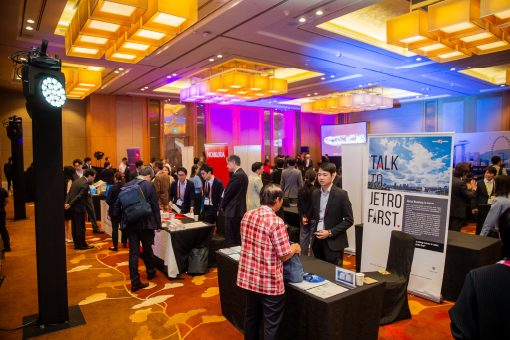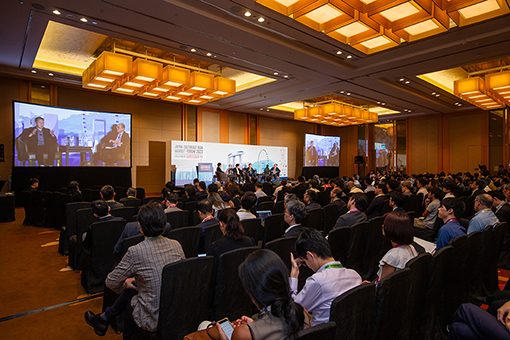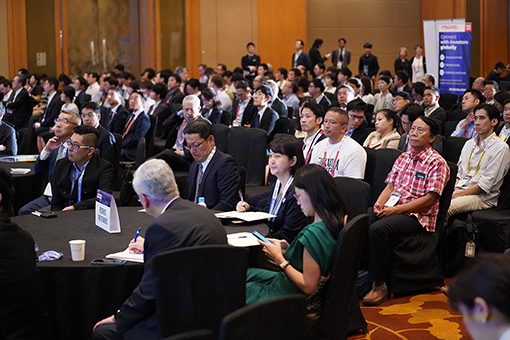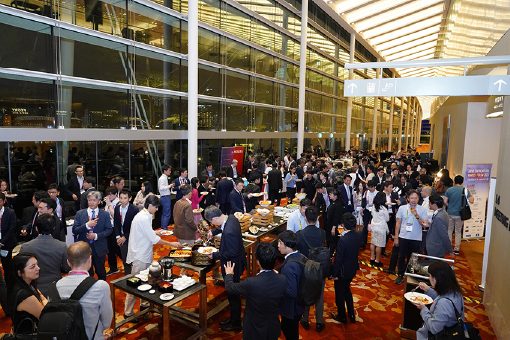Partner content in association with
Japan-Southeast Asia Market Forum: Evolution of Collaborative Ties
Riding the wave of heightened global investor interest in Japanese companies, corporate Japan aims to capitalize on this momentum to fortify fundamentals and ensure long-term business sustainability. Asia has seen an acceleration in Japan’s synergistic partnerships across the region to further innovations and cultivate the market on a global scale.
Against the backdrop of the 50th anniversary of ASEAN-Japan Friendship and Cooperation, at the second edition of the Japan-Southeast Asia Market Forum held in Singapore on 15th November 2023, industry luminaries delved into Japan’s trajectory, intertwined with Asia’s dynamic landscape, to mutually advance profitability and competitive edge of collaborators.
The event―organized by Japan Exchange Group (JPX) and Japan External Trade Organization (JETRO) in association with Nikkei Group Asia―brought together leaders from the region’s top financial institutions, investment firms, startups, and government bodies to discuss the ‘Evolution of Collaborative Ties’.
Opening Remarks
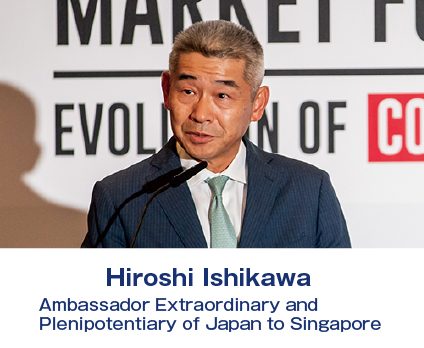
Japanese Ambassador to Singapore, Hiroshi Ishikawa, opened the event by stating in his welcome address that amidst the uncertainties in the global economy which have intensified by rising geopolitical tensions, Japan’s resilient economic standing has drawn attention from global investors, including those in Singapore.
Keynote Address : Transformational Changes of the Japanese Economy
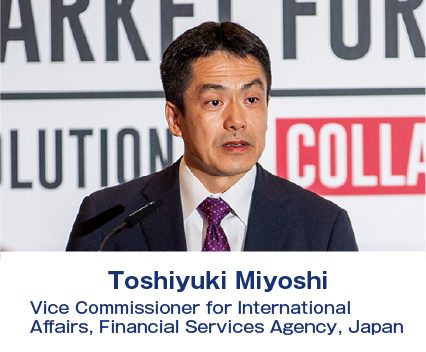
Carrying on the optimistic sentiments regarding the Japanese economy, Toshiyuki Miyoshi, Vice Commissioner for International Affairs at the Financial Services Agency of Japan, went on to say in historically high stock prices are a sign of the country’s economic transformation and growth momentum.
Miyoshi brought up the advanced technological capabilities of Japan’s private sector, pointing out the potential for collaboration with neighboring economies. He spoke about the Japanese government’s support for startups, including a “Startup Development Five-year Plan” which was formulated in November 2022, and efforts by the Financial Services Agency to strengthen capital markets for startup growth.
Addressing the challenge of shifting national savings from deposits to more productive investments, Miyoshi detailed policy measures, including the expansion of the Nippon Individual Savings Account (NISA) tax exemption scheme and ongoing corporate governance reforms.
Furthermore, he touched upon Japan’s “commitment to promoting it as a leading asset management and financial center of the world.” This involves reforming the asset management sector and asset ownership, as well as encouraging new domestic and foreign entrants and promoting competition in the Japan’s asset management sector.
Presentation: Market Reforms for a More Investable Japan
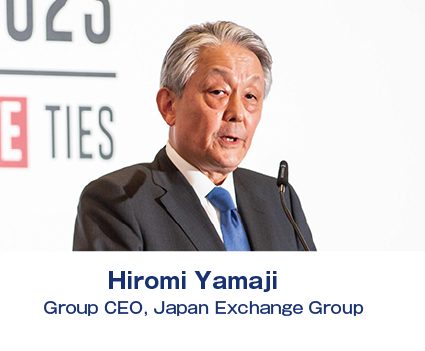
“The current level of interest in Japan is the highest we have seen in a decade,” said Hiromi Yamaji, CEO of Japan Exchange Group, during his address. He delved into the evolving environment for Japanese companies, characterized by a resurgence of businesses experiencing growing inbound demand and robust earnings. Additionally, inflationary pressures are shifting from cost-push inflation to demand-pull inflation. Acknowledging the transformative shift from a deflationary to an inflationary mindset, Yamaji pointed out the significance of increased investment, particularly with the expansion of tax exemptions under NISA. Regarding JPX’s role as a platform provider, Yamaji outlined initiatives aimed at enhancing the attractiveness and investability of the Japanese market. He referred to the “request” made by JPX in March 2023, urging low-valuation companies to formulate plans for better capital performance and disclose them. “The key is a framework that incentivizes all listed companies to voluntarily initiate growth-oriented actions, setting up the stage where investors and companies can directly engage,” he said.
Yamaji underscored the importance of initiatives promoting startup growth, saying, “Our Growth market has close to 100 IPOs every year, showcasing its strength and appeal as the IPO center for startups.” This strength is supported by market liquidity and the sizable economy. He invited attendees to explore opportunities presented by Japan, with JPX’s Singapore branch ready to assist with queries related to IPOs and investor-related matters.
Presentation: Unlocking Japan’s Growth Potential
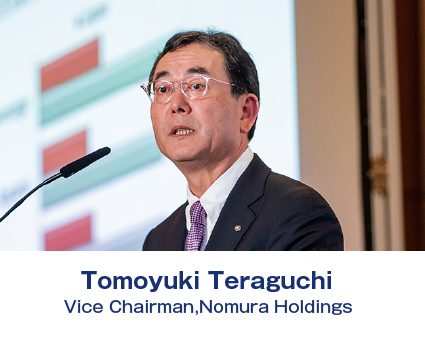
Nomura Holdings Vice Chairman Tomoyuki Teraguchi, in his address, recalled his longstanding connection with Singapore. When he was a pivotal figure in Nomura’s Asia equity businesses, he recognized Singapore’s significance in fostering closer ties between Asian and Japanese companies and global institutional investors.
Teraguchi, in his presentation, focused on three key aspects: Japan’s market reforms, the growth potential of Japanese companies, and Nomura’s role as a bridge between Japan and Asia.
Discussing market reforms, he noted the transformative changes in corporate governance and institutional engagement. Japan’s establishment of the stewardship code in 2014 and the corporate governance code in 2015 marked significant milestones, resulting in a notable increase in independent outside directors on company boards. The reduction of policy-held shareholdings, coupled with increased returns to shareholders through dividends and share buybacks, reflects a healthy evolution in shareholder structures. Teraguchi placed importance on Japan’s robust household financial assets, amounting to 2,000 trillion yen, and the Kishida administration’s plan to double asset-based income.
Teraguchi acknowledged the need for flexibility in the labor market. While Japan faces a population decline, he envisioned significant improvements in corporate operating margins if the country gains the ability to flexibly raise prices similar to Europe. Drawing comparisons, he noted that if Japan’s operating margin aligns with Europe’s, return on equity (ROE) could increase 40%, presenting further upside.
Addressing Nomura’s role in fueling the resurgence of interest in Japanese equities among international investors, Teraguchi detailed the efforts taken to convey the appeal of the Japanese market to them. Armed with the reports titled “Revisit Japan,” the analysts conducted a “caravan” for the first time in 7 years, visiting institutional investors in major cities around the world. “More recently, from August, our chief strategist of Japanese stocks and analysts have visited 360 major foreign investors,” he said.
Not limited to supporting Japanese companies alone, Nomura’s efforts to serve as a bridge between Japan and Asia were further showcased through various initiatives, including equity placements for Southeast Asia’s startups and advising large Japanese companies in expanding their presence in Asia through their capital alliances with Asian companies. Nomura is also expanding into the private market, supporting the financing of unlisted companies in Japan and Asia.
Panel Discussion: Japanese Market in the Spotlight; the Transformations Ahead
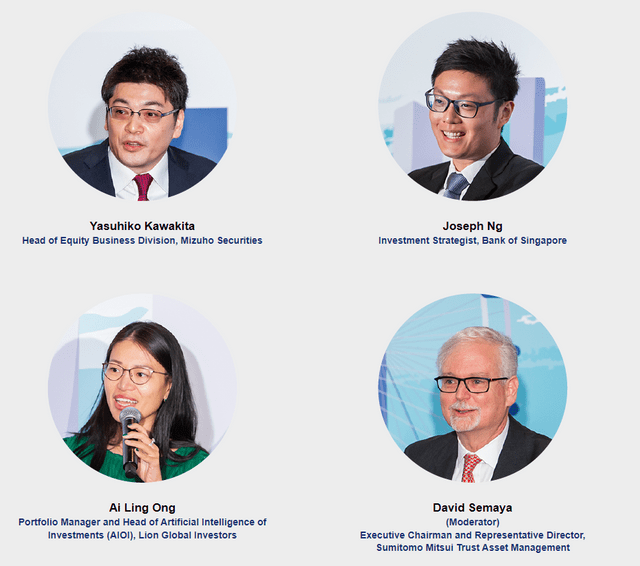
Serving as the moderator with an illustrious 36-year background in financial services, 25 of which were spent on the buy side, David Semaya opened the first panel discussion, “Japanese market in the spotlight; the transformations ahead,” by expressing that Japan stands at “a real inflection point, a time for a new renaissance, and this time is different.”
Yasuhiko Kawakita emphatically noted that the Japanese market surge was not short-lived and arbitrary, but more fundamental and that investors were starting to have conviction in structural changes being made. He echoed Semaya’s sentiments, saying “This time is different. … My job is essentially to tell global investors to buy Japan, and this year (2023), I had it very easy because they already had bullish views on Japan and corporate Japan as a whole.”
One of the key drivers of structural reform has been JPX’s call for companies with a low price-to-book ratio (PBR) to improve capital efficiency and to disclose their policies and specific initiatives for improvement. Many companies have not only made disclosures but have already started acting on dividend increases and share repurchases. Kawakita predicts that one of the reasons this trend will be sustainable is because it would be a smart way to touch on a “soft spot for corporate Japan, which is peer pressure, and use it to make a positive change,” citing the nation’s cultural inclination to avoid being left behind.
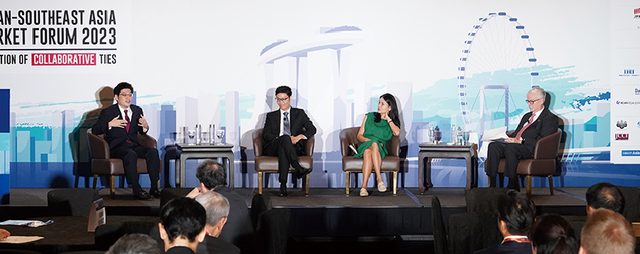
Joseph Ng discussed Japan’s unique macroeconomic setup, loose monetary policy conditions and potential changes in yield curve control. He mentioned the positive impact of wage growth and the shift from skepticism to optimism regarding corporate governance reforms, which can potentially help reduce the valuation disparities between Japanese and global companies.
Ai Ling Ong emphasized the role of AI in investments. To address the question posed of whether it is different for Japan this time, she noted that, unlike human investors who may be biased by prior disappointments, AI remains objective and considers all aspects – including technical and fundamental factors.
She noted that since 2021, her AI models have found that fundamental factors like EPS growth, margin improvement and valuation have been more important for stock performance than technical factors like fund flows and positioning; suggesting that the current rally in Japan is driven more by a focus on companies’ fundamentals rather than technical flows, which may be more shortlived. She also noted the importance of positive sentiments, likely toward corporate reforms, when the AI models are evaluating investment opportunities.
Ong then shared that her AI models, despite skepticism by human investors, have mostly been overweight on Japan since late 2020.
The discussion shifted to demographic challenges, viewing Japan’s shortage of workers as potentially positive, driving demand for wages. The panel explored how innovations like factory automation, industrial robotics and AI could address demographic challenges by supplementing the workforce.
The panel concluded that there are substantial opportunities within Japan, even with demographic challenges, and there is potential for innovation in the country’s aging society.
Presentation: Japan on the Move: Opportunities Lie Ahead
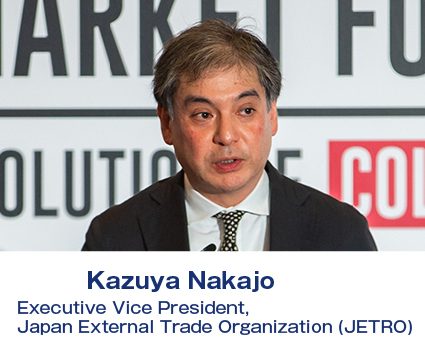
Kazuya Nakajo, executive vice president of JETRO, shared valuable insights into Japan’s market perspective. Starting with a focus on Foreign Direct Investment (FDI), he stressed the crucial role foreign companies play in Japan’s economic growth. The FDI trend in Japan has been consistently increasing, reaching 46 trillion yen last year, with a significant growth rate over the past five years. This transformation is attributed to Japan’s more open-sourcing corporate strategy, both financially and technologically.
Nakajo cited Japan’s positive changes in digitalization, English communication and openness to foreign companies, which is creating a more business-friendly environment. Collaboration between foreign and Japanese companies is on the rise, with 30% actively engaged or considering collaborations.
Turning to the Japanese startup market, Nakajo noted an 80% surge in investment volume over the last four years. Japan’s unique focus on deep-tech startups and the increasing number of university ventures showcase the vibrancy of its startup ecosystem.
Nakajo delivered three key messages: Japan has transformed its business strategy, becoming more attractive to foreign businesses; the country has taken bold measures to ease doing business, fostering a foreign-friendly environment; and there are tremendous opportunities in Japan’s startup ecosystem.
Nakajo also introduced JETRO’s supporting programs: Invest Japan, J-Bridge and J-Startup. These programs aim to assist companies worldwide in investing in Japan, foster collaboration between Japanese corporations and foreign startups, and support Japanese startups in their global endeavors.
JETRO, along with the JPX, is dedicated to enhancing Japan’s international competitiveness and invites businesses to contact them for support.
Panel Discussion: Synergistic Partnerships; Asian Innovations as a Driving Force
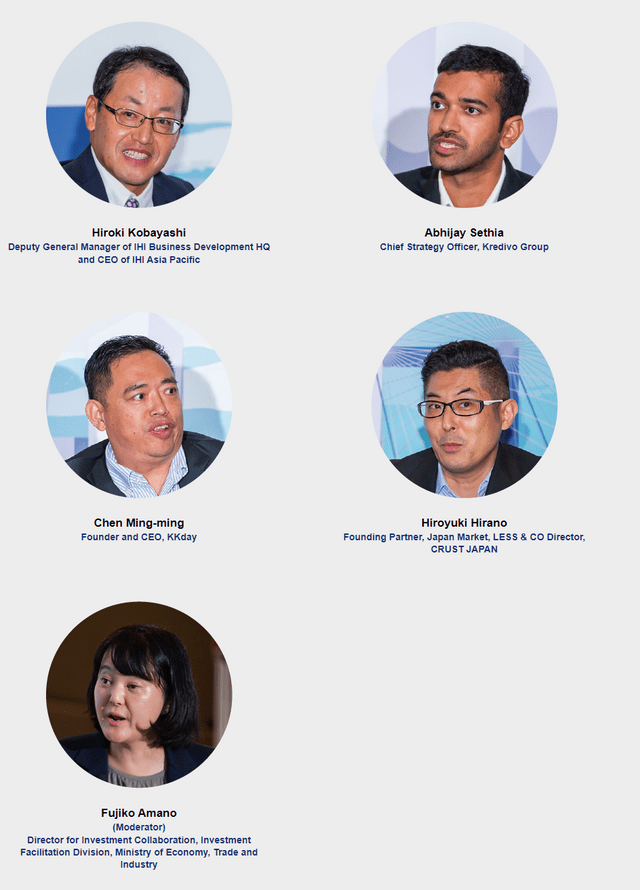
In another panel discussion titled “Synergistic Partnerships; Asian Innovations as a Driving Force,” Kobayashi from IHI represented well-established, major companies that maintain innovation by partnering with Asian counterparts, including startups. The other three represented startups expanding their businesses in the region or venturing into Japan, facilitated by collaborations with Japanese companies.
Kobayashi referred to IHI’s longstanding history spanning 170 years and its expedited shift towards a more global perspective. He explained that while IHI is proud of its manufacturing technologies, known as “monozukuri,” it is embracing transformation to meet the changing nature of end-to-end value chains that demand cross-border partnerships. The company is focusing on aero engines and space, clean energy such as ammonia and biomass, as well as infrastructure businesses such as smart cities and transportation.
Abhijay Sethia shared insights into Kredivo Group’s eight-year journey, focusing on digital consumer credit services in Indonesia and Vietnam. The company’s emphasis on fast, low-cost and widely accessible financial services has resulted in an impressive user base. Notably, Kredivo has successfully introduced a two-minute application and approval process, revolutionizing credit accessibility in Indonesia.
Ming-ming Chen of KKday, an e-travel platform, discussed the company’s evolution over the past decade. With a significant presence in Asia and offices in various countries, KKday has become a leading platform for booking local tours and activities. Key strategic investments from HIS Group and Cool Japan Fund have strengthened KKday’s collaboration with local Japanese suppliers.
Hiroyuki Hirano, representing LESS&CO Japan, called attention to the company’s commitment to sustainability and upcycling. Engaging with partners globally, LESS&CO focuses on transforming food surplus into valuable products, such as turning bread into beer. Achieving the prestigious B Corp certificate, LESS&CO has demonstrated its dedication to sustainable practices.
Amano provided an overview of Japan’s efforts to foster a dynamic startup ecosystem. She emphasized Japan’s action plan for attracting human and financial resources from overseas.
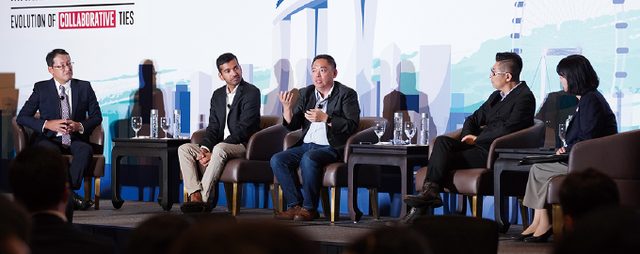
Kobayashi elaborated on IHI’s decision to establish its business development headquarters in Singapore. The move signifies IHI’s dedication to the Asian market and its understanding of the necessity for strategic collaboration in emerging value chains. Kobayashi also emphasized IHI’s willingness to collaborate with startups and technology companies in order to achieve global objectives.
Sethia addressed the collaboration between Kredivo Group and Mizuho Bank, noting the strategic fit between their objectives. He discussed the differences in the financial sectors of Japan and Indonesia, emphasizing Indonesia’s early-stage economic development and the potential for financial services growth.
Chen shared KKday’s collaborative approach with Japanese partners, focusing on building trust with local suppliers. Strategic investments from HIS Group and Cool Japan Fund facilitated KKday’s expansion in Japan. The company’s innovative SaaS model, Rezio System, empowered local suppliers to manage bookings and inventory efficiently.
Hirano discussed LESS&CO’s successful collaboration with Kita-Kyushu City, showcasing the company’s impactful initiatives in Japan. He emphasized the importance of leveraging foreign companies’ unique strengths in the Japanese market and adopting a collaborative, hyper-local business model.
The session accentuated Japan’s ongoing efforts to embrace innovation, attract global talent, and foster an environment conducive to startup growth.
Panel Discussion: From Asia to the World; Big Dreamers’ View of the Future
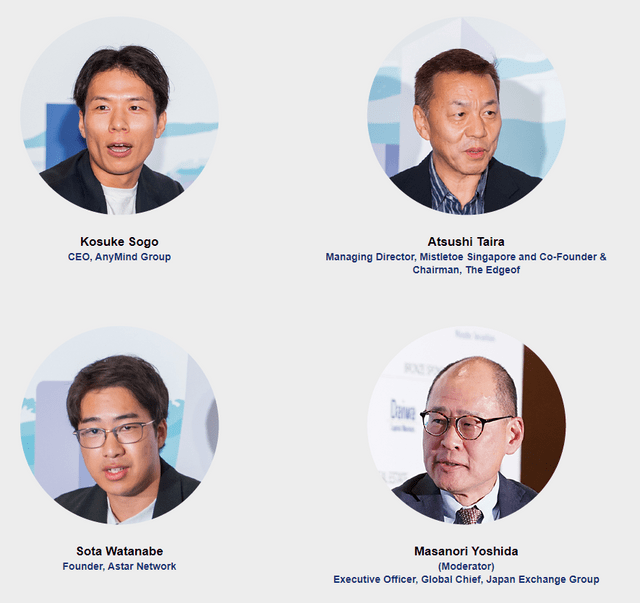
The panel discussion, “From Asia to the World; Big Dreamers’ View of the Future,” offered profound insights from influential figures in the startup arena. All three panelists have established and are operating their startups and investment funds out of Singapore, embodying the spirit of Japanese entrepreneurs and investors seeking opportunities in both Asian and global markets right from the outset.
Sogo shared the journey of AnyMind Group, founded in Singapore in 2016, with a mission to make businesses borderless through digitalization. He outlined the global acceleration of business digitalization, operating in 14 Asian countries, and strategically “balancing global tech development with localized sales and marketing activities.”
Watanabe introduced Astar Network, envisioning it as an “Apple store in Web3.” He underscored the potential of Web3 in Asia, drawing parallels to the state of the internet in 1999. Pointing to Asia’s current momentum, he emphasized its capability to drive Web3 software technology, seeing that it can be “the first software technology driven by Asia.”
Taira provided insight into Mistletoe, a family office based in Singapore, that focuses on cross-border startups and “deep tech-driven social impact companies with substantial returns on investment.” He then shed light on The Edgeof, a VC arm also based in Singapore investing in global and local startups aiming to expand businesses in Asian markets. Taira stressed the importance of “creating a corridor to bridge the silos” in Asia’s diverse markets. The Edgeof is developing its AI platform to modernize traditional VC operations, and Taira also emphasized the importance of involving conglomerates and major established firms in the ecosystem.
The speakers delved into the significance of diverse exit strategies, such as IPOs and M&A, to enrich the investment landscape for Asian startups. Sogo, whose company AnyMind went public on the Tokyo Stock Exchange earlier in the year, shared the rationale behind choosing the IPO bourse, citing its higher liquidity, scale and participation of high-quality investors compared to other exchanges in Asia.
Responding to Yoshida’s query about expectations towards policymakers, the speakers stressed the importance of policies that promote global expansion, incentivize innovation and create a supportive regulatory framework. Watanabe also highlighted the necessity for Japanese entrepreneurs to adopt a more global mindset, encouraging young founders to “focus on going global from day one.”
